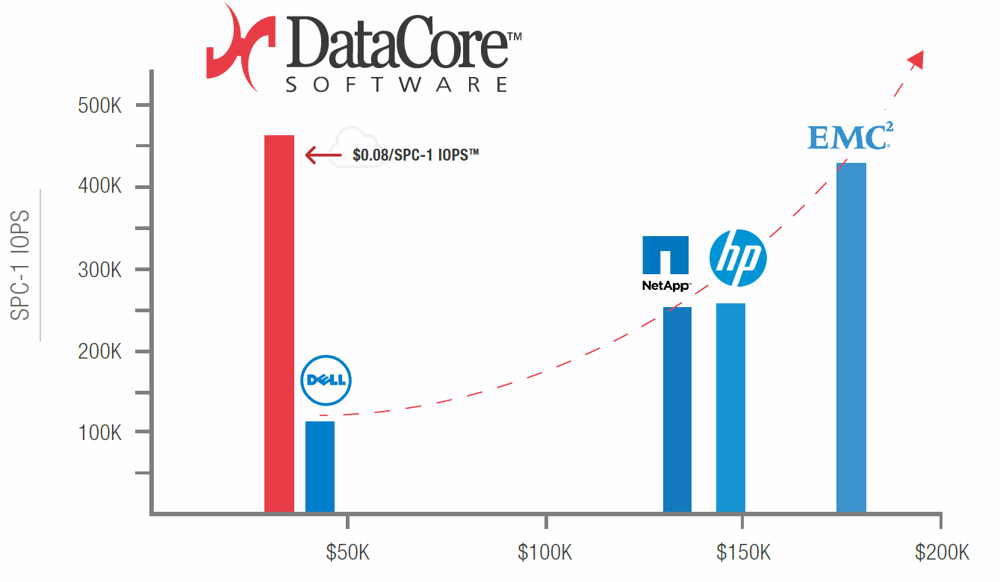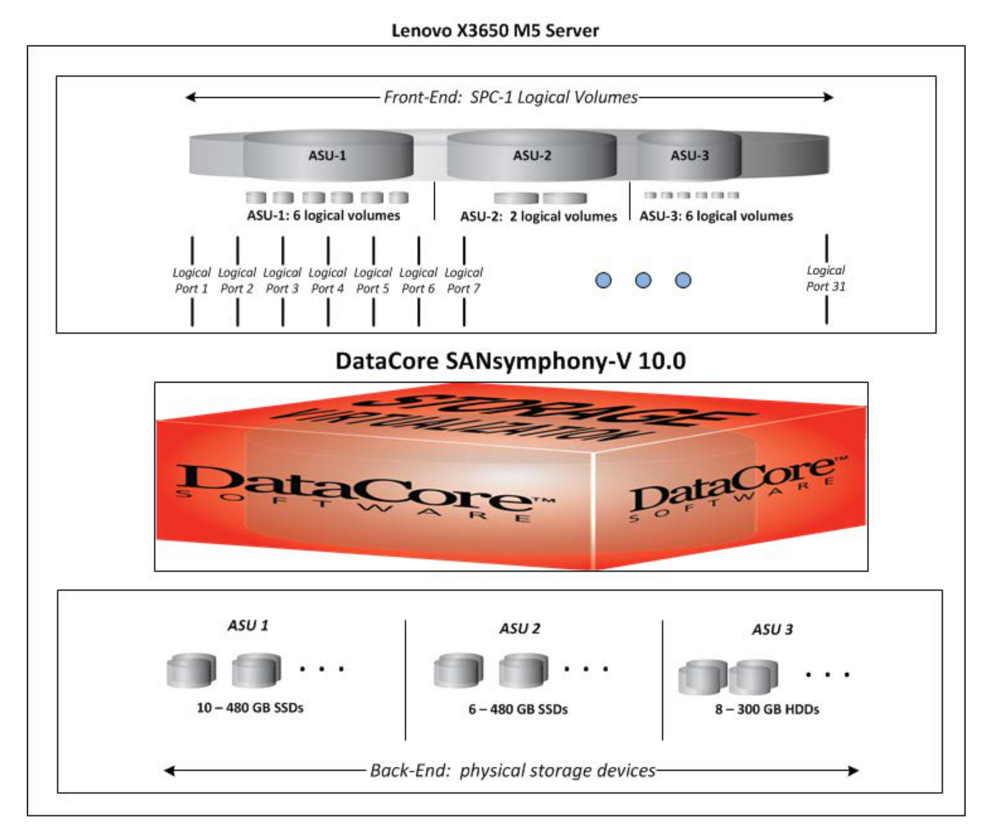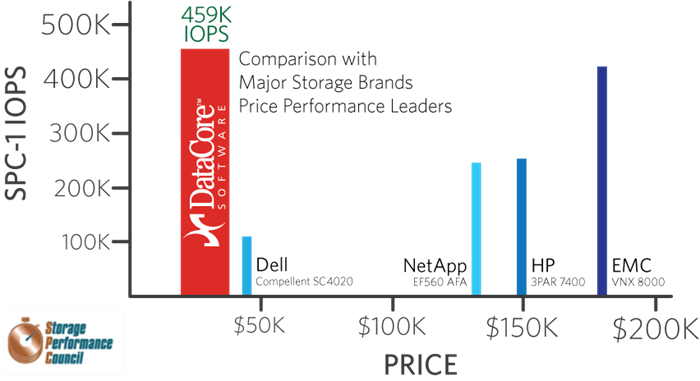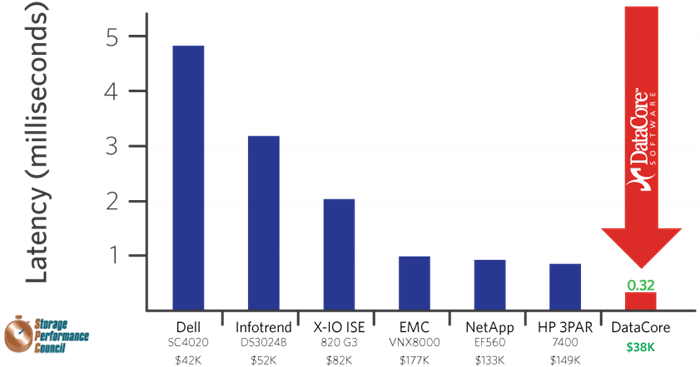DataCore’s Parallel I/O Software Runs Enterprise Storage and Application Workloads at $0.08 per SPC-1 IO/s
While driving fastest response times ever reported
This is a Press Release edited by StorageNewsletter.com on January 18, 2016 at 3:02 pmDataCore Software Corporation announced a world record for price-performance using the industry’s recognised and peer reviewed storage benchmark, the Storage Performance Council‘s SPC-1.
Thanks largely to its parallel I/O software that harnesses the untapped power of multi-core processors, this achievement places the company with an audited SPC-1 price-performance of $0.08 or 0.05 pence per SPC-1 IO/s [1] and as the clear-cut leader in SPC-1 price-performance overall. DataCore certified its results on a powerful but compact 2U Lenovo‘s system x3650 M5 multi-core server featuring Xeon E5-2600 v3 series processors with a mix of flash SSD and disk storage. On this same platform, the company also recorded the fastest response times ever attained, even compared to the many all-flash arrays and multi-million dollar name brand systems that have published SPC-1 results.
“With these first certified results, DataCore has put a stake in the ground to demonstrate our parallel I/O performance and hyper-converged capability. For us, this is just the beginning. Look for future benchmarking to incorporate multi-node HA configurations and to demonstrate I/O originating from both inside and outside the servers – the future for all storage systems,” stated Ziya Aral, chairman, DataCore. “We have only just begun to show the potential of our inherently parallel I/O architecture.“
Hyper-converged system handles compute, parallel I/O processing and storage workloads
Notably, the record-breaking price-performance results were achieved on a hyper-converged solution capable of servicing both enterprise storage requirements and demanding database and transaction processing application workloads – all running together on the same platform.
Hyper-converged systems must demonstrate that they can cost-efficiently handle combined enterprise storage and application workloads. Unlike SPC-1 results that characterise only external storage systems excluding the servers used to generate the load, company’s $0.08 per SPC-1 IO/s result includes the cost to generate the workload and, therefore, encompasses the total cost and end-to-end requirements for running the enterprise application.
“We’d like to see others, like Nutanix and SimpliVity, publish SPC-1 benchmark numbers to reveal how they fare against our record-breaking SPC-1 Price-Performance results. Then customers can clearly assess the cost implications of these alternatives,” challenges George Teixeira, CEO, DataCore. “There’s been much speculation about how these systems perform under I/O-intensive workloads generated by mission-critical enterprise applications. Using the peer-reviewed SPC-1 full disclosure process provides an objective frame of reference for making comparisons prior to any buying decisions.“
The Results: Record-breaking price-performance for both storage and hyper-converged
For the benchmark, the company used an off-the-shelf, hyper-converged system targeting enterprise OLTP and latency-sensitive database applications rated for 459,290.87 SPC-1 IO/s, with a total cost for hardware, software and three years of support coming in at $38,400.29, making it the top SPC-1 price-performance result of $0.08 per SPC-1 IO/s. That is a 300% improvement over the previous record of $0.24 per SPC-1 IO/s [2] attained by the Infortrend EonStor DS 3024B and less than 25% of the cost of popular top-of-the-line storage arrays including EMC VNX 8000 [3], NetApp EF560 [4] All Flash Array, Dell Storage SC4020 [5], and HP 3PAR StoreServ 7400 [6].
The company and IBM are the only companies to benchmark a hyper-converged system where the SPC-1 applications and storage workloads they generate are both serviced on the same platform. This means that company’s $38,400.29 price includes not only the storage components, but all of the host server resources and the hypervisor software needed to run the enterprise database/OLTP workloads generated by the benchmark. For comparison, the only other hyper-converged system with publicly reported SPC-1 results is an IBM Power 780 Server. Their SPC-1 price-performance result is $4.56 per SPC-1 IO/s [7]. That system attained 780,081.02 SPC-1 IO/s at a total price of $3,557,709.00, or roughly 91 times more costly than the firm’s solution.
Company’s adaptive parallel I/O technology exploits power of multi-core CPUs
The price-performance ratings can be attributed in major part to company’s Adaptive Parallel I/O techniques intrinsic to the design of the SANsymphony-V software-defined storage services platform. The firm executes many independent I/O streams simultaneously across multiple CPU cores, reducing the latency to service and process I/Os by taking full advantage of cost-effective but dense, multi-core servers such as the Lenovo System X machines. Competing products serialise I/O limiting their throughput and slowing their response times.
“Lenovo initially approached us to run the demanding SPC-1 enterprise workload benchmark. They wanted proof we could fully harness the power of their multi-core servers given the abundance of unsubstantiated performance claims circulating in hyper-converged circles,” continued Teixeira. “They soon realized with parallel I/O, we had a rocket ship in our hands.“
“Lenovo is excited to partner with DataCore to disrupt the storage marketplace providing customers the best price and performance in the industry” stated Chris Frey, VP and GM, Lenovo North America. “DataCore’s industry-leading SPC-1 results on Lenovo System x demonstrate the performance, innovation and reliability that Lenovo is delivering to meet the growing storage needs to our customers.“
SPC-1 Benchmark – Tested/priced configuration
The SPC-1 performance testing is designed to demonstrate a system’s performance capabilities for business-critical enterprise workloads typically found in database and transaction processing environments. The audited configuration that was tested and priced includes SANsymphony-V parallel I/O software on a Lenovo System x3650 M5 multi-core server featuring Xeon E5-2600 v3 series processors running Windows Server, equipped with 16 SSDs and 8 HDD drives. The company also supports Hyper-V, VMware ESXi, Linux KVM and other hypervisor-based solutions. It can also run directly on Windows servers when server virtualisation is not appropriate.
‘Less is more’ with hyper-converged virtual SAN and software-defined storage
SANsymphony-V software reduces the I/O limitations and bottlenecks that restrict the number of VMs and workloads that can be consolidated on server and hyper-converged platforms. The software enables industry-standard x86 servers to gain the essential storage functionality needed to meet today’s demanding tier-1 business application requirements. It runs on off-the-shelf servers and works infrastructure-wide across all types of storage (flash, disk and cloud) to automate and optimise performance and resource allocation.
Company’s parallel I/O software takes advantage of today’s advanced generation of multi-core server platforms – allowing companies to increase productivity and server consolidation savings by supporting the I/O needed to run more VMs and more application workloads faster and at a much lower cost.
Company’s parallel-io information
Infographic
[1] SPC Benchmark 1 Full Disclosure Report DataCore Software Corporation DataCore SANsymphony-V 10.0 (Current as of 11/30/2015)
[2] SPC Benchmark 1 Full Disclosure Report, Infortrend Technology, Inc., Infortrend EonStor DS 3024B (Current as of 6/12/2015)
[3] SPC Benchmark 1 Full Disclosure Report, EMC Corporation, EMC VNX8000 (Current as of 7/30/2015)
[4] SPC Benchmark 1 Full Disclosure Report, NetApp, Inc., NetApp EF560 Storage System (Current as of 1/27/2015)
[5] SPC Benchmark 1 Full Disclosure Report, Dell, Inc., Dell Storage SC4020 (Current as of 3/18/2015)
[6] SPC Benchmark 1 Full Disclosure Report, Hewlett Packard Company, HP 3PAR StoreServ 7400 (Current as of 5/23/2013)
[7] SPC Benchmark 1 Full Disclosure Report, IBM Corporation, IBM Power 780 (Current as of 4/11/2013)


















 Subscribe to our free daily newsletter
Subscribe to our free daily newsletter


